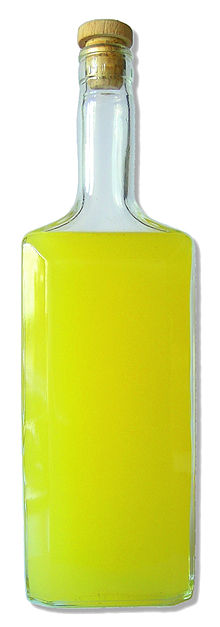Limoncello: Difference between revisions
m Reverted edits by 69.181.194.39 (talk) to last version by Pd THOR |
m →Production: Removed 2nd person |
||
| Line 3: | Line 3: | ||
== Production == |
== Production == |
||
Unlike many other liqueurs, limoncello is easy and inexpensive to produce, requiring only sugar, water, lemon zest, alcohol, and time to mature. Homemade limoncello often has a stronger, more pronounced lemon flavor than brands sold in stores |
Unlike many other liqueurs, limoncello is easy and inexpensive to produce, requiring only sugar, water, lemon zest, alcohol, and time to mature. Homemade limoncello often has a stronger, more pronounced lemon flavor than brands sold in stores. To do this, pure 96% alcohol must be used and it should be diluted only after extraction, as 40% vodka does not extract all the oil flavors from the peel. |
||
Different varieties of lemon are used to produce different flavors. The variety of lemon used is usually dictated by [[region]], the lemons of [[Amalfi]] producing a particularly pleasant limoncello. Various alcohols can be used to give varying flavors. [[Grappa]] is sometimes used, as is refined pure alcohol. A more refined alcohol maximizes the lemon flavor, whereas darker alcohols add complexity. Higher quality sugars used in the infusion process create a sweeter liqueur. |
Different varieties of lemon are used to produce different flavors. The variety of lemon used is usually dictated by [[region]], the lemons of [[Amalfi]] producing a particularly pleasant limoncello. Various alcohols can be used to give varying flavors. [[Grappa]] is sometimes used, as is refined pure alcohol. A more refined alcohol maximizes the lemon flavor, whereas darker alcohols add complexity. Higher quality sugars used in the infusion process create a sweeter liqueur. |
||
Revision as of 14:49, 29 October 2007

Limoncello [limon'tʃɛlːo] is a lemon liqueur produced in Southern Italy, mainly in the region around the Gulf of Naples and the coast of Amalfi and islands of Procida, Ischia and Capri, but also in Sicily, Sardinia, Menton in France and the Maltese island of Gozo. It is made from lemon rinds, alcohol, water, and sugar. It is bright yellow in color, sweet and lemony, but not sour since it contains no lemon juice.
Production
Unlike many other liqueurs, limoncello is easy and inexpensive to produce, requiring only sugar, water, lemon zest, alcohol, and time to mature. Homemade limoncello often has a stronger, more pronounced lemon flavor than brands sold in stores. To do this, pure 96% alcohol must be used and it should be diluted only after extraction, as 40% vodka does not extract all the oil flavors from the peel.
Different varieties of lemon are used to produce different flavors. The variety of lemon used is usually dictated by region, the lemons of Amalfi producing a particularly pleasant limoncello. Various alcohols can be used to give varying flavors. Grappa is sometimes used, as is refined pure alcohol. A more refined alcohol maximizes the lemon flavor, whereas darker alcohols add complexity. Higher quality sugars used in the infusion process create a sweeter liqueur.
Serving
Limoncello is traditionally served chilled as an after dinner digestivo. Along the Amalfi Coast, it is usually served in small ceramic glasses themselves often chilled, the Amalfi coast being a center of both ceramic and limoncello production. This tradition has been carried into other parts of Italy.
Limoncello outside Italy
Limoncello is common in Italy but has only recently become popular in other parts of the world. Restaurants in the United States, the United Kingdom, Australia and New Zealand are increasingly offering limoncello on their beverage and dessert menus. It is an increasingly popular ingredient in cocktails, as it imparts a strong lemon flavor without the sourness or bitterness of actual lemon juice.
Limoncello gained a measure of notoriety in America on 29 November, 2006, when actor Danny DeVito appeared on the television show The View apparently still drunk from consuming limoncellos the night before with his friend George Clooney. Said DeVito, "I knew it was the last seven limoncellos that was going to get me." [1] On 30 April, 2007, DeVito announced the launch of his own line of limoncello.
More publicity for limoncello was gained when pop singer Avril Lavigne mentioned in numerous interviews in the beginning of 2007 that she not only wrote the song "I Can Do Better" (appearing on her third record) while intoxicated after consuming half a bottle of limoncello, but she also recorded the song drunk. She even mentions the affair in the song's second verse: "I will drink as much limoncello as I can, and I'll do it again and again." [2]
Similar liqueurs
There are a number of similar liqueurs produced within and outside of Italy. Some are slight variations, some use lemon juice as well, and some use other citrus fruits. These include Limoncino, Limonello, and Limonetta or even Crema di Limoncello which is made with milk, or milk products, to give a creamy texture. Also common is a liqueur made in the same fashion, but using Mandarin oranges, called mandarino; as well as a ginger liqueur called zenzerino.
External links
- LA Times Limoncello Article
- Washington Post: Limoncello Recipe Using Grain Alcohol
- SouthFloridaGourmet.com Article on Gioia Luisa Lemoncello from Sorrento
- "Limoncello" on Webtender.com
This article needs additional citations for verification. (August 2007) |
